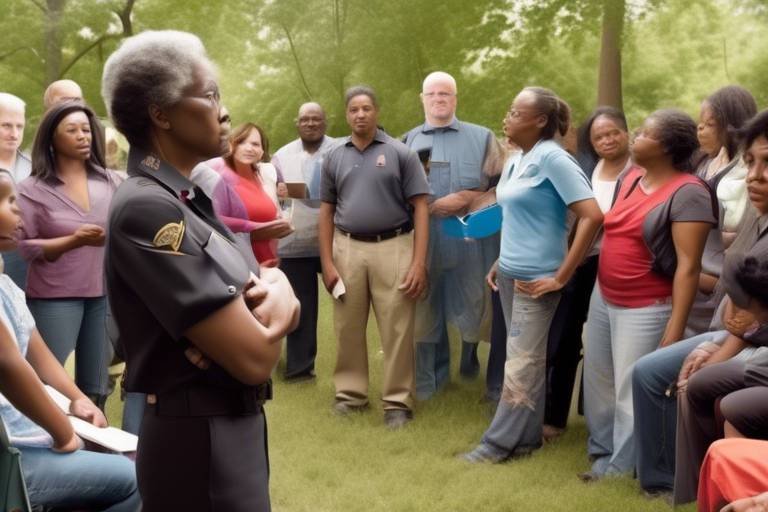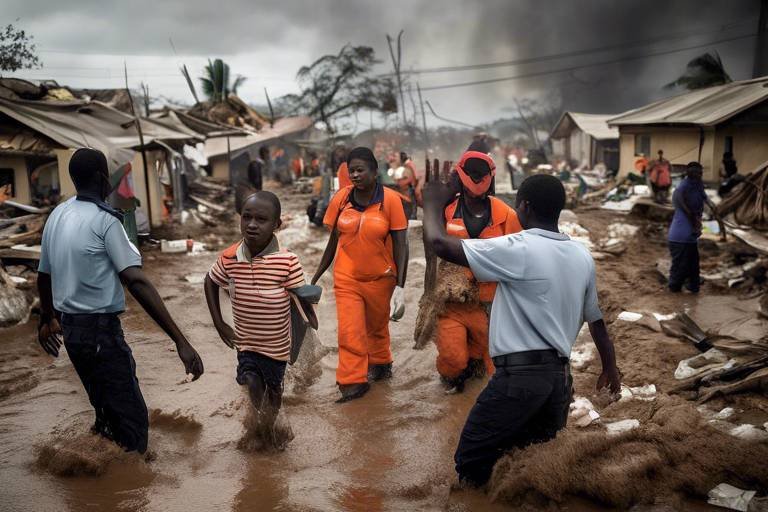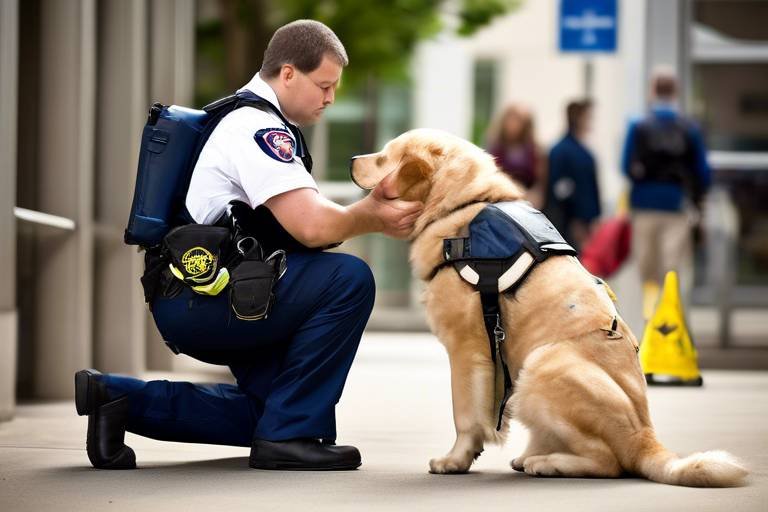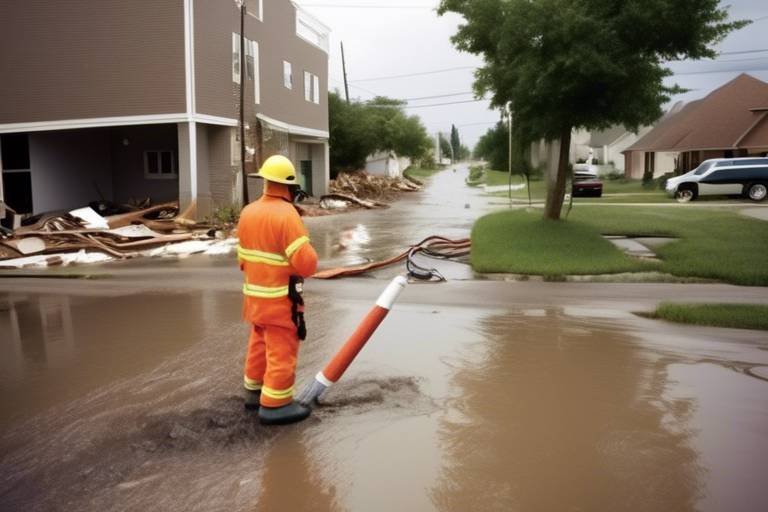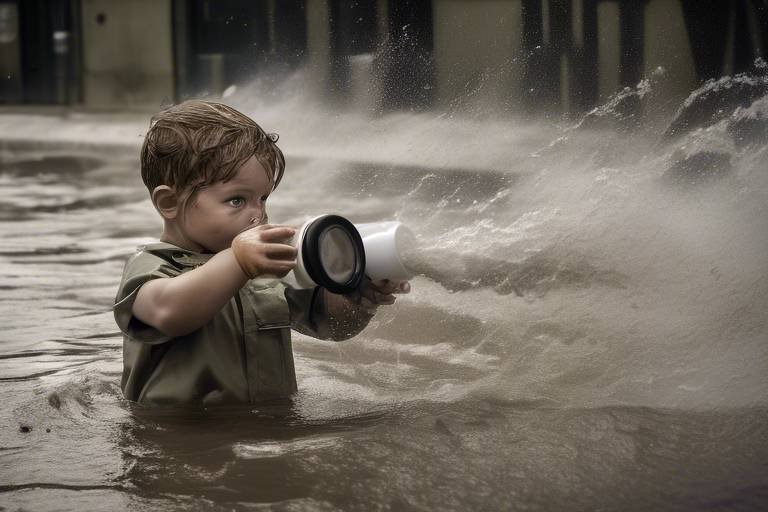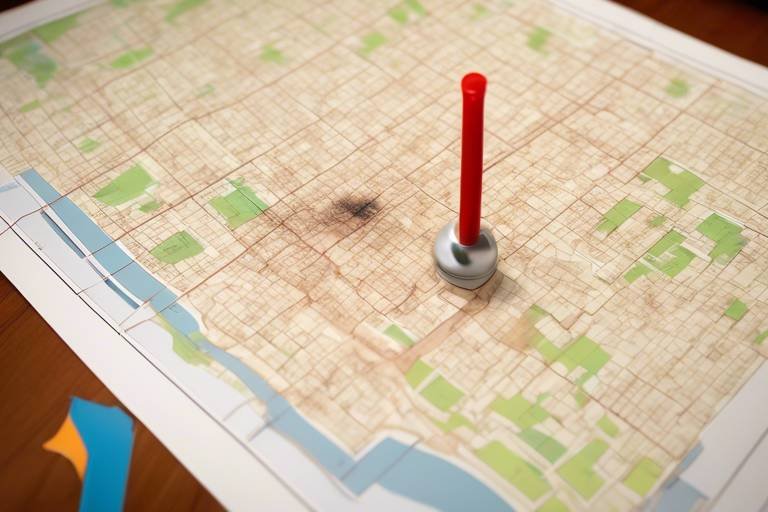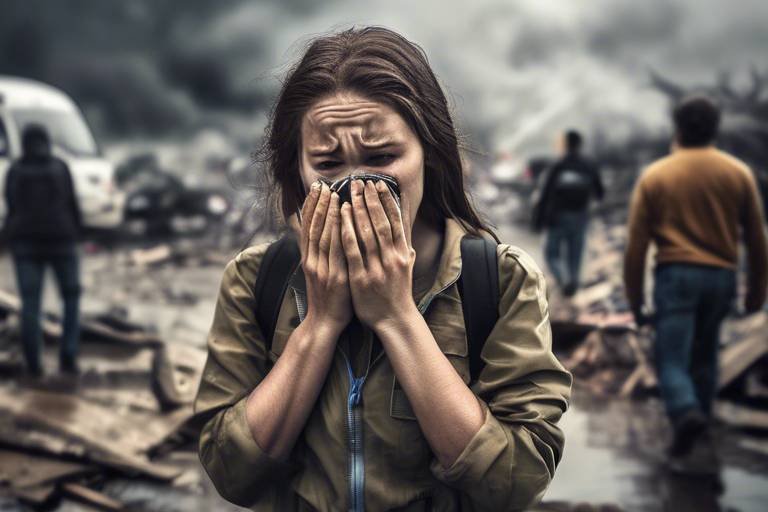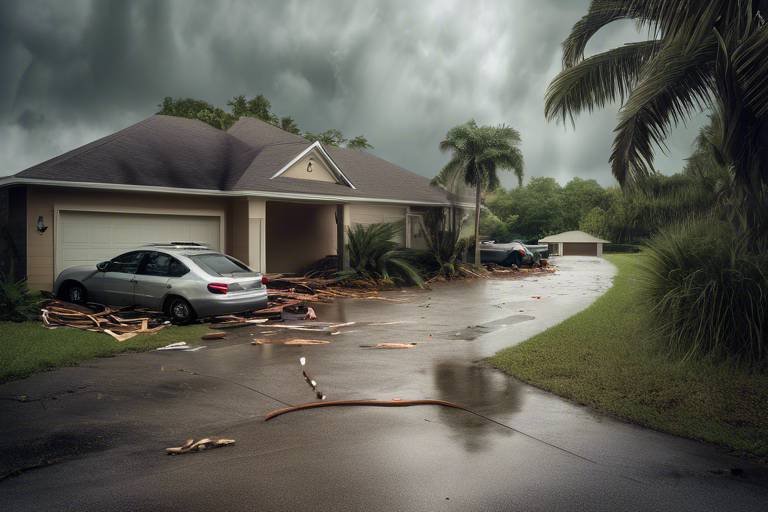The Psychological Impact of Emergencies
Emergencies can strike without warning, turning our lives upside down in an instant. Whether it’s a natural disaster, a public health crisis, or a personal tragedy, the psychological effects can be profound and far-reaching. It’s not just about the immediate chaos; it’s about the lingering emotional scars that can haunt individuals and communities for years to come. Understanding the psychological impact of emergencies is crucial for fostering resilience and recovery. So, what really happens to our minds during these tumultuous times?
When an emergency occurs, our brains react like a well-oiled machine, but sometimes, that machine can get stuck in overdrive. The initial shock can lead to a flurry of emotions that range from fear and confusion to anger and sadness. Imagine your mind as a roller coaster—one minute you’re at the peak, feeling on top of the world, and the next, you’re plummeting into the depths of despair. This unpredictable emotional landscape is a hallmark of psychological distress during emergencies.
Moreover, the psychological impact isn’t just limited to those directly involved. Communities as a whole can experience a ripple effect, where one person's trauma can influence the emotional well-being of others. This interconnectedness underscores the importance of collective healing and support. After all, we are social creatures, and our mental health is often intertwined with those around us.
In the following sections, we will explore various aspects of this complex issue, including the nature of trauma, common emotional responses, coping mechanisms, and the vital role of support systems. By delving into these topics, we can better understand how to navigate the turbulent waters of psychological distress and emerge stronger on the other side.
Trauma is a significant psychological impact of emergencies. It can be defined as a deeply distressing or disturbing experience that overwhelms an individual’s ability to cope. Trauma can take many forms, from physical harm to emotional upheaval. It’s essential to recognize that trauma is not a one-size-fits-all experience; it varies greatly from person to person. Some may experience acute trauma immediately following an event, while others may develop chronic trauma that lingers for years.
Types of trauma can include:
- Acute Trauma: Resulting from a single incident.
- Chronic Trauma: Resulting from repeated and prolonged exposure to highly stressful events.
- Complex Trauma: Exposure to multiple traumatic events, often of an invasive, interpersonal nature.
Understanding how trauma manifests is crucial for recognizing its effects. Symptoms can include flashbacks, nightmares, severe anxiety, and uncontrollable thoughts about the event. It’s like a shadow that follows you, sometimes lurking in the background, while at other times, it can feel all-consuming.
In emergencies, people often experience a range of emotional responses. The initial reaction might be shock or disbelief, as if the world has suddenly become surreal. As the reality sets in, feelings of fear and anxiety can take center stage. It’s normal to feel overwhelmed and confused, as our minds try to make sense of the chaos around us. This emotional turmoil can lead to a rollercoaster of feelings, including:
- Fear: A primal response that can be paralyzing.
- Anxiety: Worrying about what might happen next.
- Sadness: Mourning losses, whether they are personal or communal.
These emotional responses can significantly affect mental health, leading to issues such as depression and anxiety disorders. Recognizing these feelings as normal reactions to abnormal situations is the first step toward healing.
Coping mechanisms are crucial for managing psychological stress during emergencies. They can be broadly categorized into adaptive and maladaptive strategies. Adaptive strategies, like seeking social support or engaging in physical activity, can help individuals process their experiences and find a path toward recovery. On the other hand, maladaptive strategies, such as substance abuse or avoidance, can exacerbate the situation and lead to long-term issues.
Some effective coping mechanisms include:
- Talking it out: Sharing feelings with friends or family.
- Physical activity: Exercise can be a great stress reliever.
- Mindfulness and meditation: Techniques that help ground you in the present moment.
Finding the right coping strategies is like discovering the right tools for a job; the right ones can make all the difference in achieving emotional resilience.
Support systems play a vital role in recovery from emergencies. Family, friends, and community resources contribute significantly to emotional resilience and healing. It’s important to remember that you don’t have to face the aftermath alone. Just as a sturdy bridge can help you cross a turbulent river, a strong support network can help you navigate the emotional challenges that arise after an emergency.
In the next sections, we will delve deeper into the long-term psychological effects, the unique vulnerabilities of children during emergencies, and the importance of community resilience.
Emergencies can lead to long-term psychological effects, including PTSD and anxiety disorders. The potential for chronic mental health issues following traumatic events is significant, making it crucial to recognize symptoms early and seek help. The longer one waits to address these issues, the more entrenched they can become, like weeds in a garden that need to be uprooted before they take over.
Children are particularly vulnerable during emergencies. They may not fully understand what is happening, leading to confusion and fear. Supporting their emotional well-being is essential, as their experiences can shape their mental health for years to come. Just as a young tree needs proper care to grow strong, children need nurturing support to help them weather the storms of life.
Community resilience is essential in overcoming the psychological impacts of emergencies. Collective efforts can foster recovery and strengthen mental health. When communities come together, they create a network of support that can help individuals heal and rebuild. It’s like a tapestry; each thread contributes to the strength and beauty of the whole.
Accessing professional help is crucial for those affected by emergencies. Mental health resources, such as counseling and support groups, can provide the necessary tools for coping and recovery. Seeking support after a crisis is not a sign of weakness; rather, it’s an important step toward healing and reclaiming one’s life.
Q: What are the signs of trauma after an emergency?
A: Signs can include flashbacks, nightmares, anxiety, and emotional numbness. It’s essential to seek help if these symptoms persist.
Q: How can I help someone dealing with trauma?
A: Listen without judgment, offer support, and encourage them to seek professional help if needed.
Q: Are children affected differently by emergencies?
A: Yes, children may not fully understand the situation, leading to unique emotional responses. Providing reassurance and stability is crucial for their well-being.
Q: What are some effective coping strategies?
A: Talking about feelings, engaging in physical activity, practicing mindfulness, and seeking social support are all effective coping mechanisms.

Understanding Trauma
Trauma is a significant psychological impact of emergencies. It’s like a shadow that looms over individuals, often following them long after the initial crisis has passed. But what exactly is trauma? In simple terms, trauma is the emotional response that occurs when an individual experiences an event that is overwhelmingly distressing or threatening. It can be triggered by a variety of emergencies, such as natural disasters, accidents, or violent incidents.
There are different types of trauma, and understanding these can help us grasp the profound effects emergencies can have on mental health. Acute trauma results from a single, distressing event, while chronic trauma stems from repeated and prolonged exposure to highly stressful events, such as ongoing domestic violence or living in a war zone. Lastly, complex trauma refers to exposure to varied and multiple traumatic events, often of an invasive, interpersonal nature. Each type manifests uniquely in individuals, influencing their emotional and psychological well-being.
After experiencing a crisis, individuals may exhibit a range of symptoms that can be categorized into three main areas: re-experiencing the trauma, avoidance, and increased arousal. Re-experiencing can include flashbacks or nightmares that transport the individual back to the traumatic event, making it feel as if it's happening all over again. Avoidance might manifest as steering clear of reminders of the event, whether that’s places, people, or even conversations that trigger painful memories. Meanwhile, increased arousal can lead to heightened anxiety, irritability, or difficulty sleeping, creating a cycle that can be hard to break.
It's essential to recognize that trauma is not just a personal struggle; it can ripple through communities, affecting relationships and social dynamics. For instance, when a community faces a natural disaster, the collective trauma can lead to a shared experience of grief, loss, and confusion. This interconnectedness often means that the effects of trauma are felt not just by individuals, but by families, neighborhoods, and entire societies.
Understanding trauma is the first step toward healing. Recognizing the signs and symptoms can empower individuals to seek help and begin the journey of recovery. Whether through professional therapy, support groups, or community resources, addressing trauma head-on is crucial for restoring emotional balance and resilience.

Common Emotional Responses
When emergencies strike, they often unleash a whirlwind of emotions that can leave individuals feeling like they’re on an emotional rollercoaster. Fear is one of the most immediate reactions, as the unexpected nature of crises can trigger a primal instinct to protect oneself. Imagine standing in the eye of a storm; the chaos around you can feel overwhelming, and fear becomes a natural response. This emotion can manifest in various ways, from panic attacks to a general sense of unease that lingers long after the event has passed.
Alongside fear, anxiety often creeps in, creating a fog of uncertainty that clouds thoughts and actions. It’s like trying to navigate through a dense forest where every shadow feels threatening. People may find themselves constantly worrying about what could go wrong next, leading to a cycle of stress that can be hard to break. This heightened state of alertness may also disrupt sleep patterns, making it difficult for individuals to rest and recover.
Another common emotional response is confusion. In the aftermath of an emergency, individuals may struggle to comprehend what has happened, often feeling disoriented and lost. This confusion can lead to difficulty in making decisions, as the mind grapples with the reality of the situation. It’s akin to trying to solve a puzzle with missing pieces; without a clear picture, it’s hard to know how to proceed.
Moreover, anger can also surface as a reaction to feelings of helplessness or injustice. Individuals might feel frustrated with the circumstances or even with themselves for not being able to control the situation. This anger can be directed outward, towards others or even towards the situation itself, which can complicate relationships and hinder recovery. Understanding these emotional responses is crucial, as they can significantly impact mental health in the long run.
It's important to recognize that these feelings are not just individual experiences; they can ripple through communities, affecting collective mental health. When people share their experiences and emotions, it can foster a sense of connection and understanding, which is vital for healing. Community support can help validate these feelings, reminding individuals that they are not alone in their struggles.
In summary, the emotional responses to emergencies are complex and varied. They can include:
- Fear - A natural instinct to protect oneself.
- Anxiety - A persistent worry about future threats.
- Confusion - Difficulty in processing what has happened.
- Anger - Frustration stemming from feelings of helplessness.
Recognizing and addressing these emotional responses is a crucial step in the journey towards recovery, both for individuals and communities.
- What are the most common emotional responses to emergencies?
Common emotional responses include fear, anxiety, confusion, and anger, all of which can significantly impact mental health. - How can I cope with my emotions after an emergency?
Engaging in healthy coping mechanisms such as talking to friends, seeking professional help, and practicing self-care can aid in managing emotional responses. - Why is community support important during emergencies?
Community support fosters connection and understanding, helping individuals feel less isolated in their experiences and promoting collective healing.

Coping Mechanisms
Coping mechanisms are the mental strategies that individuals employ to manage the stress and emotional turmoil that often follow emergencies. Think of them as the psychological tools in your toolbox, ready to help you navigate the stormy seas of trauma and anxiety. In the wake of a crisis, people can respond in a myriad of ways, and understanding these mechanisms can be crucial to fostering resilience. There are two primary categories of coping mechanisms: adaptive and maladaptive.
Adaptive coping mechanisms are those that help individuals manage their stress in a healthy way. These strategies can include seeking social support, engaging in physical activity, and practicing mindfulness or meditation. For instance, reaching out to a friend or family member for a chat can provide emotional relief and a sense of connection when everything feels overwhelming. Similarly, physical activities like jogging or yoga can release endorphins, which are natural mood lifters. On the other hand, maladaptive coping mechanisms, such as substance abuse, avoidance, or denial, can lead to further complications and may exacerbate the psychological impact of the emergency.
Imagine you’re in the eye of a hurricane—while the winds are howling around you, you can either hunker down and brace for the worst, or you can seek shelter and find ways to ride out the storm. The choices you make in this moment can dictate how you emerge on the other side. Here’s a quick rundown of some common coping strategies:
- Seeking Support: Whether it’s talking to friends, family, or professionals, sharing your feelings can lighten the load.
- Physical Activity: Exercise is a powerful antidote to stress; it helps clear your mind and boosts your mood.
- Mindfulness and Relaxation: Techniques like meditation, deep breathing, or yoga can help center your thoughts and reduce anxiety.
- Journaling: Writing down your thoughts and feelings can provide clarity and serve as a therapeutic outlet.
It's important to recognize that everyone copes differently. What works for one person might not resonate with another. This diversity in coping strategies can be likened to a buffet; you can pick and choose what feels right for you. However, the key is to remain aware of your coping mechanisms and to strive for those that foster growth and healing, rather than those that lead to further distress.
In addition to individual strategies, community support can play a significant role in coping. Engaging in community activities or support groups can provide a sense of belonging and shared experience, which can be incredibly healing. After all, going through tough times together can forge stronger bonds and create a network of support that benefits everyone involved.
Ultimately, understanding and employing effective coping mechanisms can significantly influence how individuals process their experiences after an emergency. By fostering resilience and encouraging healthy coping strategies, we can better prepare ourselves and our communities to face the challenges that life throws our way.
Q: What are adaptive coping mechanisms?
A: Adaptive coping mechanisms are healthy strategies that help individuals manage stress, such as seeking support, exercising, and practicing mindfulness.
Q: How can I identify maladaptive coping strategies?
A: Maladaptive coping strategies often involve avoidance or harmful behaviors, such as substance abuse or denial. If a strategy leads to more stress or negative outcomes, it may be maladaptive.
Q: Why is community support important in coping?
A: Community support provides a sense of belonging and shared experience, which can enhance emotional resilience and help individuals feel less isolated in their struggles.

The Role of Support Systems
When emergencies strike, the psychological toll can be overwhelming. It’s during these times that the importance of support systems becomes glaringly evident. Support systems are the networks of family, friends, and community resources that provide emotional and practical assistance during crises. Think of them as your safety net; when life throws you into the chaotic abyss of an emergency, having a reliable support system can mean the difference between sinking and swimming.
First and foremost, emotional support from loved ones plays a crucial role in helping individuals process their experiences. When someone goes through a traumatic event, they may feel isolated, as if no one can truly understand what they're going through. This is where a strong support system can step in, offering a listening ear and a shoulder to cry on. Just like a lighthouse guiding ships through stormy seas, supportive friends and family can illuminate the path to healing.
Moreover, practical support is equally vital. This can include helping with daily tasks, providing meals, or even assisting with financial needs. In emergencies, the last thing a person needs is to worry about mundane chores. Imagine trying to navigate a flood while also figuring out how to pay the bills; it’s an impossible task. This is why having friends and family who can step in and lend a helping hand is invaluable. They can alleviate some of the burdens, allowing individuals to focus on recovery.
In addition to personal relationships, community resources also play a significant role in providing support. Many communities have established networks that offer counseling, food banks, and shelters during emergencies. These resources can be life-savers, providing not just immediate relief but also long-term recovery options. For example, local mental health organizations often set up crisis intervention teams to assist those affected by disasters. This means that the community can rally together in times of need, showcasing the power of collective resilience.
However, it’s important to recognize that not all support systems are created equal. Some individuals may find that their support network is lacking, or they may feel uncomfortable reaching out for help. This is where education about the importance of seeking support comes into play. Encouraging open conversations about mental health can help destigmatize the act of asking for help. It’s essential to remind people that it’s okay to lean on others; after all, we are all human, and everyone needs a little support sometimes.
In conclusion, the role of support systems in the aftermath of emergencies cannot be overstated. They provide the emotional and practical assistance needed to navigate the tumultuous waters of recovery. Whether it’s through friends, family, or community resources, having a solid support network can foster resilience and promote healing. So, the next time you or someone you know faces an emergency, remember to reach out and lean on those who care. It’s a small step that can lead to significant strides toward recovery.
- What is a support system? A support system is a network of family, friends, and community resources that provide emotional and practical assistance during difficult times.
- Why is a support system important during emergencies? A support system helps individuals cope with the psychological effects of emergencies by offering emotional support, practical assistance, and resources for recovery.
- How can I build a support system? Building a support system involves nurturing relationships with friends and family, participating in community groups, and being open about your needs and feelings.
- What should I do if I feel my support system is lacking? If you feel your support system is inadequate, consider reaching out to local community resources, support groups, or mental health professionals for additional help.

Long-term Psychological Effects
This article explores the various psychological effects that emergencies can have on individuals and communities, including trauma, stress, and coping mechanisms.
Trauma is a significant psychological impact of emergencies. This section will delve into its definition, types, and how it manifests in individuals after experiencing crises.
In emergencies, people often experience a range of emotional responses. This section will discuss common feelings such as fear, anxiety, and confusion, and how they affect mental health.
Coping mechanisms are crucial for managing psychological stress during emergencies. This section will explore adaptive and maladaptive strategies individuals use to cope with their experiences.
Support systems play a vital role in recovery from emergencies. This section will examine how family, friends, and community resources contribute to emotional resilience and healing.
Emergencies can leave a lasting mark on the psyche, often leading to that can linger long after the initial crisis has passed. One of the most commonly recognized conditions is Post-Traumatic Stress Disorder (PTSD), which can manifest through a variety of symptoms such as flashbacks, severe anxiety, and uncontrollable thoughts about the traumatic event. Imagine standing on the edge of a cliff; while you may step back to safety, the fear of falling might still haunt you, even when you're on solid ground.
Beyond PTSD, individuals may also experience anxiety disorders, depression, and other mental health issues. The emotional toll can be likened to carrying a heavy backpack filled with rocks; each traumatic experience adds another stone, making it increasingly difficult to move forward. In fact, research shows that:
| Psychological Effect | Percentage of Affected Individuals |
|---|---|
| PTSD | 7-8% of the population |
| General Anxiety Disorder | 5-6% of the population |
| Major Depressive Disorder | 3-4% of the population |
The long-term effects can also vary based on factors such as the individual's previous mental health status, the nature of the emergency, and the level of support received during and after the crisis. It's crucial to recognize that not everyone will develop these long-term effects, but for those who do, the journey to recovery can be complex and filled with challenges.
Moreover, the impact of emergencies is not confined to the individual level; entire communities can suffer from collective trauma. This shared experience can lead to a sense of isolation and fear, further exacerbating mental health issues. Think of it as a ripple effect; one person's trauma can create waves that affect the emotional well-being of others in the community.
In summary, the long-term psychological effects of emergencies can be profound and far-reaching. Acknowledging these impacts is the first step toward healing, both individually and collectively. As we navigate through these challenges, it's essential to foster open conversations about mental health and seek appropriate support when needed.
Children are particularly vulnerable during emergencies. This section will focus on the unique psychological impacts on children and how to support their emotional well-being.
Community resilience is essential in overcoming the psychological impacts of emergencies. This section will explore how collective efforts can foster recovery and strengthen mental health.
Accessing professional help is crucial for those affected by emergencies. This section will outline available mental health resources and the importance of seeking support after a crisis.
- What is PTSD? PTSD, or Post-Traumatic Stress Disorder, is a mental health condition triggered by experiencing or witnessing a traumatic event.
- How can I support someone who has experienced an emergency? Listen without judgment, encourage them to seek professional help, and be there for them emotionally.
- Are children affected differently than adults during emergencies? Yes, children may not fully understand the situation, leading to unique emotional responses and behavioral changes.
- What resources are available for mental health support? Many organizations offer counseling services, hotlines, and community support groups for those affected by emergencies.

Children and Emergencies
When emergencies strike, children often find themselves in a whirlwind of confusion and fear. Their understanding of the world is still developing, making them particularly vulnerable to the psychological impacts of crises. Imagine being a child, suddenly faced with chaos—everything familiar is turned upside down. This can lead to feelings of insecurity and anxiety that may linger long after the immediate danger has passed.
Children process trauma differently than adults. While adults might articulate their feelings of fear and anxiety, children often express themselves through behavior rather than words. They may exhibit changes in sleeping patterns, regression to earlier developmental stages, or even physical symptoms like stomachaches or headaches. It's as if their minds are trying to protect them, but in doing so, they manifest these feelings in ways that can be puzzling for parents and caregivers.
To better understand how emergencies affect children, it's essential to recognize the different ways they might respond. Common reactions include:
- Fear of separation: Children may become clingy, fearing that they will be separated from their parents or caregivers.
- Increased anxiety: They may worry excessively about their safety or the safety of loved ones.
- Behavioral changes: This can include acting out, withdrawing from friends, or reverting to behaviors like thumb-sucking or bedwetting.
Supporting a child's emotional well-being during and after an emergency is crucial. Here are some strategies that can help:
- Open communication: Encourage children to express their feelings. Let them know it's okay to be scared and that their feelings are valid.
- Routine and stability: Maintaining a sense of normalcy can provide comfort. Try to keep daily routines as consistent as possible.
- Reassurance: Remind children that they are safe and that adults are there to protect them. This can help alleviate some of their fears.
Moreover, it's vital to be aware of the long-term impacts that emergencies can have on children. Without proper support, they may develop chronic issues such as anxiety disorders or post-traumatic stress disorder (PTSD). Therefore, recognizing the signs of distress and seeking professional help when necessary is essential. Engaging with mental health professionals who specialize in children's trauma can make a significant difference in their recovery journey.
In conclusion, children are not just little adults; their emotional responses to emergencies are unique and require special attention. By understanding their perspectives and providing the necessary support, we can help them navigate through the storms of life, fostering resilience and emotional strength for the future.
- What are common signs of trauma in children after an emergency? Look for changes in behavior, sleep disturbances, or increased anxiety. Children might also show regression in their developmental milestones.
- How can I help my child cope with fear during an emergency? Open communication is key. Listen to their fears, reassure them, and maintain routines to provide a sense of normalcy.
- When should I seek professional help for my child? If your child's distress persists for several weeks or interferes with their daily life, consider reaching out to a mental health professional.

Community Resilience
is a powerful concept that embodies the collective strength of a group of people facing adversity. When emergencies strike, whether they be natural disasters, pandemics, or other crises, the ability of a community to bounce back is crucial. It's like a tightly woven fabric; when one thread is pulled, the entire structure can either unravel or hold strong. This resilience isn't just about recovery; it's about thriving in the aftermath of hardship.
So, what does it take for a community to be resilient? First and foremost, it requires strong social ties. When individuals feel connected to their neighbors and local organizations, they are more likely to support one another during tough times. Think of it as having a safety net; when one person falls, there are others to catch them. Communities that foster relationships through social events, volunteer programs, and local initiatives often find themselves better prepared to handle emergencies.
Additionally, effective communication plays a vital role. During an emergency, clear and timely information can make all the difference. Communities that establish communication channels—like community boards, social media groups, or local radio stations—can disseminate important updates and resources quickly. This not only helps in managing the immediate crisis but also reduces the anxiety that often accompanies uncertainty.
Moreover, community preparedness is essential. This involves planning and training for potential emergencies. Workshops, drills, and resource-sharing initiatives can empower individuals with the knowledge and skills they need to respond effectively. For instance, a community that regularly conducts emergency response drills is likely to react more swiftly and cohesively when a real crisis occurs. This preparedness fosters a sense of control, which is incredibly comforting during chaotic times.
Another critical aspect of community resilience is the availability of resources and support systems. Communities that have established networks for mental health support, food security, and emergency services are better equipped to help their members recover. These resources act as lifelines, providing not just physical assistance but also emotional support. The importance of having a well-stocked food pantry or a mental health hotline cannot be overstated, as they can alleviate some of the stress and anxiety that arise during emergencies.
In conclusion, community resilience is not just a buzzword; it’s a vital component of how we face and overcome challenges. By fostering strong relationships, ensuring effective communication, preparing for emergencies, and providing essential resources, communities can create an environment where individuals feel supported and empowered. When we work together, we can transform crises into opportunities for growth and solidarity.
- What is community resilience? Community resilience refers to the ability of a community to withstand and recover from adverse situations, such as disasters or crises, through collective efforts and support.
- How can communities build resilience? Communities can build resilience by fostering strong social ties, establishing effective communication channels, preparing for emergencies, and ensuring access to resources and support systems.
- Why is social connection important in emergencies? Social connections provide emotional support and practical assistance, helping individuals to cope better during crises and facilitating quicker recovery.
- What role does communication play in community resilience? Effective communication ensures that community members receive timely and accurate information during emergencies, helping to reduce anxiety and promote coordinated responses.

Professional Help and Resources
When emergencies strike, the emotional and psychological aftermath can feel overwhelming. It's like being caught in a storm without an umbrella—exposed and vulnerable. During such times, seeking professional help becomes not just beneficial, but essential. Mental health professionals, including therapists, psychologists, and counselors, are equipped with the tools and knowledge to guide individuals through the tumultuous waves of emotional distress.
Accessing mental health resources can vary based on location, but many options are available to help those affected by crises. For instance, community health centers often provide affordable mental health services, and non-profit organizations may offer free counseling sessions. Additionally, online therapy platforms have surged in popularity, making it easier than ever to connect with a therapist from the comfort of your home. This is particularly helpful for those who may feel anxious about attending in-person sessions.
Here’s a quick look at different types of resources available:
- Hotlines: Many organizations provide 24/7 hotlines to offer immediate support. These can be a lifeline for someone in distress.
- Support Groups: Connecting with others who have experienced similar situations can foster a sense of community and understanding.
- Therapy Services: Individual therapy can help process trauma and develop coping strategies. Group therapy is also beneficial for shared experiences.
- Online Resources: Websites and apps dedicated to mental health can provide coping strategies and immediate assistance.
Utilizing these resources can significantly aid in the recovery process. It’s important to remember that seeking help is a sign of strength, not weakness. Just like you wouldn’t hesitate to see a doctor for a physical ailment, addressing mental health is equally vital. Many people find that therapy not only helps them process their experiences but also equips them with tools to handle future stressors more effectively.
Moreover, mental health professionals can tailor their approach based on individual needs. For example, someone dealing with post-traumatic stress disorder (PTSD) might benefit from specialized therapies like Eye Movement Desensitization and Reprocessing (EMDR) or Cognitive Behavioral Therapy (CBT). These methods are designed to help individuals reframe their thoughts and feelings about the trauma, promoting healing and resilience.
In conclusion, the path to recovery after an emergency is often paved with the support of mental health professionals and community resources. It's crucial to take that first step and reach out for help. Remember, you are not alone, and there are people and services ready to assist you on your journey to emotional well-being.
Q1: How do I know if I need professional help after an emergency?
A1: If you find yourself experiencing persistent feelings of sadness, anxiety, or overwhelming stress, it may be time to seek professional help. Changes in sleep patterns, appetite, or social withdrawal are also signs that you might benefit from talking to a mental health professional.
Q2: What should I expect during my first therapy session?
A2: Your first session is typically a time for you and your therapist to get to know each other. You’ll discuss your reasons for seeking help, your history, and what you hope to achieve through therapy. It’s a safe space to express your feelings and concerns.
Q3: Are there resources available for children affected by emergencies?
A3: Yes, many organizations provide specialized support for children, including therapy tailored to their developmental needs and group activities that foster peer support.
Q4: How can I find a mental health professional?
A4: You can start by asking your primary care physician for recommendations, searching online directories, or checking with local mental health organizations for referrals.
Frequently Asked Questions
- What is trauma, and how does it relate to emergencies?
Trauma refers to the emotional and psychological response that individuals experience after a distressing event. In the context of emergencies, trauma can arise from witnessing or experiencing life-threatening situations, leading to feelings of helplessness and fear. It can manifest in various ways, including flashbacks, anxiety, and emotional numbness.
- What are some common emotional responses people have during emergencies?
During emergencies, it's normal for individuals to experience a whirlwind of emotions. Common responses include fear, which can feel like a heavy weight on your chest; anxiety, which can make your heart race; and confusion, where everything feels disoriented. These feelings are natural and can significantly affect mental health if not addressed.
- How can people cope with the psychological stress of emergencies?
Coping mechanisms vary widely among individuals. Some people might lean on adaptive strategies, like talking to friends or engaging in physical activities, while others might resort to maladaptive methods, such as substance abuse. It's essential to recognize what works best for you and seek healthier outlets for stress relief.
- Why are support systems important during emergencies?
Support systems, including family, friends, and community resources, play a crucial role in recovery. They provide emotional backing, practical help, and a sense of belonging, which can significantly enhance resilience. Having someone to talk to can make a world of difference when dealing with the aftermath of an emergency.
- What are the long-term psychological effects of emergencies?
Emergencies can lead to long-lasting psychological issues, such as Post-Traumatic Stress Disorder (PTSD) and anxiety disorders. These conditions can persist long after the initial event, affecting daily life and relationships. It's vital to seek help if symptoms linger, as early intervention can lead to better outcomes.
- How do emergencies affect children differently than adults?
Children are particularly vulnerable to the psychological impacts of emergencies. They may not fully understand what is happening, leading to heightened feelings of fear and insecurity. Supporting their emotional well-being involves providing reassurance, maintaining routines, and encouraging open communication about their feelings.
- What is community resilience, and why is it important?
Community resilience refers to the collective ability of a community to adapt and recover from crises. It is vital because strong community ties can foster emotional support, resource sharing, and collaborative recovery efforts, ultimately leading to a healthier environment for everyone involved.
- What resources are available for professional help after an emergency?
Accessing professional help is crucial for those affected by emergencies. Resources can include therapy, counseling services, hotlines, and support groups. Many organizations offer free or low-cost services, and it's essential to reach out for support to navigate the healing process effectively.


